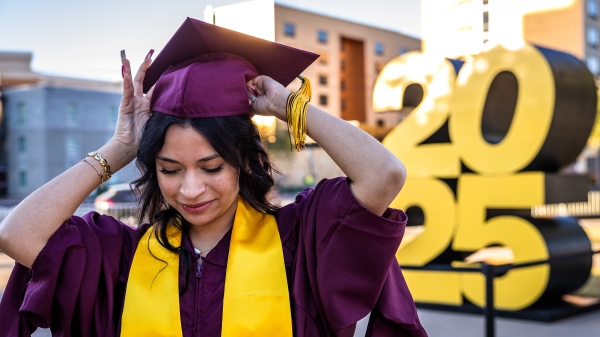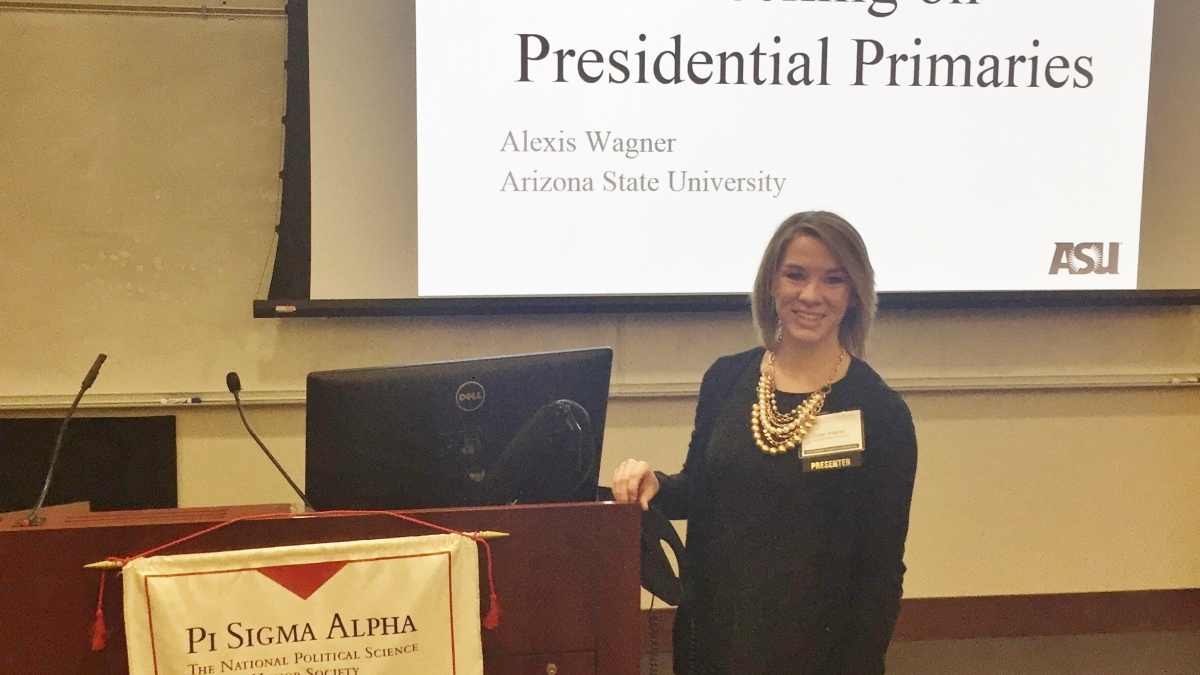Alexis Wagner is a senior at ASU majoring in political science in the 4+1 Program. With the assistance of the Global Studies Travel Grant offered by the School of Politics and Global Studies (SPGS), Wagner was able to attend a Pi Sigma Alpha National Student Research Conference in Washington, D.C. After her trip, Wagner took the time to provide a recap of her experiences:
Question: What was it like to go to the Pi Sigma Alpha National Student Research Conference in Washington, D.C.?
Answer: This conference was an opportunity for undergraduate students to present individual research in a professional setting. The conference took place at George Washington University in Washington, D.C. There were 67 participants who presented on topics surrounding American politics, comparative politics, and international relations. I presented a paper that I wrote based on a group research project ("The Impact of Fact Checking on Presidential Primaries") that was conducted last semester in Dr. Fridkin's POS 503 course. After presenting, each participant received feedback from the panel discussant, and then members of the panel were able to ask questions. It was an amazing experience to get more detailed feedback from someone not involved in the development of the project so that they did not have any bias towards the project. I also loved being asked our reasoning behind some of the project's decisions and also get some ideas on how to make it even better if it were to be continued in the future. This was a great experience that provided me an opportunity to meet other students from across the country and learn from their ideas as well as share my own ideas with them.
Q: What did you learn/enjoy the most from your trip?
A: What I learned most from my trip was that writing a paper and explaining it in a short 12-minute presentation are completely different. Our project was very detailed and could be confusing, so having a short amount of time to explain everything I needed to was very difficult. I enjoyed the challenge, though, and I am so glad that I had a great set of instructors supporting me and helping me prepare for this experience.
I also learned that it is important to take criticism and learn from your mistakes. I saw that students who were not open to criticism on their papers struggled in this conference and that those that accepted the feedback planned to make their papers better so that it will be more likely to succeed in the future. It is important to know that criticism isn't to tear you down, but to help you get better.
Q: What are your plans after graduation?
A: After I graduate in May, I plan to continue my master’s degree that I have already started as part of the 4+1 program. I am not exactly sure what I plan to do after graduation; however, whatever I do I hope to make a difference in the world. When I worked for the Treasury Department last summer I gained a love for working for the federal government and would love to return to that field!
Q: How do you think this trip will help you attain your career aspirations?
A: This trip helped me realize that political science is trying to explain the world, so being open to new ideas and understanding and findings is an important part of learning about everything that is going on and seeing why it is happening. I think that this trip gave me a new understanding of how important the research that we are doing is and how the findings can be applied to the government so that it can help change our country, and even the world in some cases, for the better.
Q: What advice would you give someone who was looking to have a similar trip experience?
A: If I were to give someone looking to have a similar trip experience some advice I would tell them to be prepared to receive both positive and negative feedback on their research, but to do something with that feedback. The conference was not just there to tell students how great they were; it was there to help them get better. I think that the most important thing to do if attending this trip is to listen to the feedback and then edit your paper! Doing nothing to your paper and ignoring the feedback after attending the conference limits your potential!
More University news

Year in review: ASU's top stories for 2025
It has been a year of big announcements and bold research discoveries, as Sun Devils worked to make lives better across Arizona…

ASU launches Operation Comeback to help Arizonans finish their degrees
Arizona State University has launched a new initiative called Operation Comeback to help Arizona residents who started college at…

Fall 2025 grads encouraged to enter next chapter of life with optimism
Newly minted Arizona State University graduates were urged to help America strive toward a greater democracy as they celebrated…
